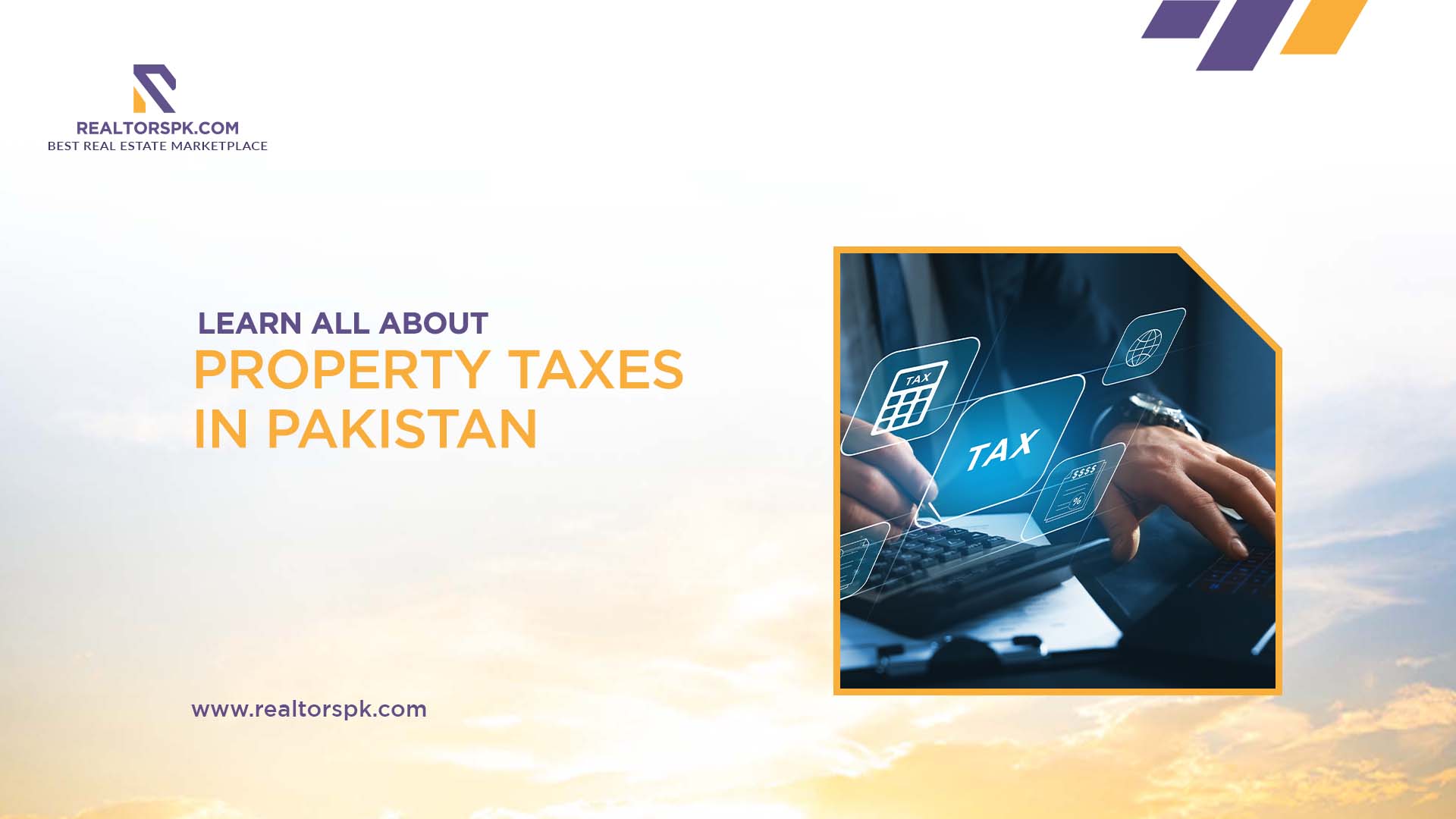Let’s talk about something important but often overlooked: property taxes in Pakistan. You know, for a country to do well, having a solid system for collecting taxes is key. And when we’re talking about taxes, property tax sure does come up a lot. It’s crucial for the health of Pakistan’s economy that everyone chips in and pays their property taxes on time.
But here’s the thing – even though we all love our country and want to see it succeed, when it comes time to pay up, a lot of us suddenly find other things to do. It’s a bit of an open secret that most people, after building fancy properties and successful businesses, decide it’s time for a vacation abroad right around tax season. This is a big reason why Pakistan isn’t shining as brightly as it could on the world stage.
Speaking of which, if you’re looking to invest in real estate, you should consider the best areas to invest in Islamabad. Investing there could not only be a smart move for your portfolio but also a way to contribute to the country’s growth by responsibly managing your property taxes.
Now, let’s talk about you. Paying your property taxes isn’t just a duty; it’s a way to contribute to Pakistan’s growth and development. Trying to hide your property to escape taxes? That’s not only unfair but also illegal.
In this blog, we’re focusing on property taxes in Pakistan, specifically how they work and why they matter. So if you are looking into business ideas in Pakistan, understanding property taxes can give you a solid head start.
By the way, are you paying your tax?
Being a responsible citizen, paying your tax on property in Pakistan should be your priority. It will work as your contribution to raising your economy and the development of Pakistan. Hiding your property in order not to pay their taxes is considered to be a crime by law.
In this blog, we are going to talk about a tax on property in Pakistan. So let’s have a detailed overview of excise and taxation in pakistan. Additionally, we will also show you how to perform excise and taxation Punjab online verification.
Table of Content
1. What is Tax?
In simple words, if we define tax, then it’s a state’s source of income. Tax is received and managed under the supervision of the taxation system and used in schemes, projects, and development. More precisely, it’s a percentage cost of your earnings that is given to the government.
2. What is Property Tax?
It’s a tax on the property we rent, sell, or purchase. This gain tax on property in Pakistan is used to support the government to launch new projects, build infrastructure and to increase Country GDP’s.
How To Check Property Tax Online?
Looking to figure out your property tax online in Pakistan? Do not stress yourself – you can easily check it with the online Property Tax Pakistan calculator. Whether it’s for plots, houses, or any other property, taxes apply. But, if we’re talking about plots, it’s key to understand Plot Size Conversions in Pakistan first. Once you’ve got that down, calculating your tax will be a lot easier.
3. What is a Tax Year?
The Tax Year in Pakistan is from 1st July to 30th June.
4. What Was Property Taxes in Pakistan 2022?
In 2022, according to the Finance Act 2022, the tax rate on CGT – the capital gain tax on property in Pakistan was reduced because of the destruction of immovable assets. More understandable, it was decreased on the earnings or profits of your property value if you sell it before the completion of 04 years. Let us explain to you with an example, if you have bought a property and sold it, later on, to get a maximum profit. So it will increase your property tax as well. A shorter holding period means a higher amount of CGT earned, which results in a higher tax rate.
In accordance with the 2020 Act, property ownership is restricted to a maximum duration of four years. The rate of property tax is determined by the type of property in question. It is essential to identify the best cities to invest in real estate in Pakistan as a preliminary step before considering the implications of property tax. Moreover, the capital gains tax rate, which is payable to the Excise and Taxation Department in Punjab, varies based on the duration of property ownership. Detailed information on these regulations is provided below.
Details of Gain tax on property in Pakistan
- 75% of the CGT is applicable if the holding period extends to 01 years.
- 50% of the CGT needs to be taxed if the holding period exceeds 02 years but less than 03 years.
- The difference b\w plot and any constructed property doesn’t matter.
- 100% of CGT is applicable if the holding period is less than 01 year
- CGT has decreased to 04 years.
- After the holding period exceeds more than 04 years, there is no CGT to be charged.
So let’s start before any further delay!
After the establishment of the PTI Government, one more amendment was declared for the first time to facilitate non-residents. The act is called Tax Laws Ordinance 2021. There are many factors Affecting Real Estate Market in Pakistan which also affects tax rates.
Details of Gain tax on property taxes in Pakistan
- 04 percent super tax on banks ambiguously passing the tax year 2023 has extended.
- The engine capacity vehicles withholding tax is Rs 50,000 to Rs 200,000 for the local manufacturers.
- The tax has increased. Now, instead of 2.5% tax on profits, a person has to pay 3.5% tax in case of earning less than a 05 Million profit on selling a property.
- The tax releases are also applicable on locally manufactured mobile devices.
5. Types of Property Taxes in Pakistan
Paying your tax on time is the assurance that how responsible you are? And it shows your loyalty towards your country. However, no one gets happy to give their money to someone, even if it is the excise and taxation department Punjab. But let us tell you if you try to find another way to pay taxes, which can be illegal. Then, trust us, you are finding trouble.
When it comes to property taxes in Pakistan, they’re not the same everywhere. The government has established four distinct types of property taxes, each with its own implications. To ensure compliance, it’s essential to stay updated on the latest property laws. So, if you are interested in settling among one of the best housing societies in Islamabad, navigating property taxes in Pakistan is crucial.
Type |
Definition |
Rates |
1. Capital Gains Tax |
A CGT is a Tax on profits companies or individuals gain from sales of stocks, land, or assets. | According to the Finance Act 2016, the tax is levied when real estate is sold within 3 years of the purchase. It is 10% of 1st year, 7.5% on 2nd year and 5% on 3rd year |
2. Capital Value Tax |
It is a price set by FBR. These are the official rates of real estate that are set by DC offices. | According to the Finance Act 2006, CVT is 2% of the recorded value. |
3. Stamp Duty |
It is a levy imposed on single-property transactions or papers | It is 5% of the value of property |
4. Withholding Tax |
A source-based tax, particularly imposed by certain countries on interest or dividends disbursed to a non-resident individual | It is 12.5 % if the recipient is a filer in Pakistan and 20% for a non-filer. |
1. Capital Gains Tax:
The capital gains tax is a tax imposed on the profit earned from an investment when it is sold.
The capital gains, or profits, are referred to as “realized” when stock shares or other taxable assets are sold. The tax does not apply to unrealized capital gains or unsold assets, therefore stock shares will not be taxed until they are sold, regardless of how long they are kept or how much they rise in value. It is one of the property taxes in Pakistan.
When you sell property in Pakistan and make some profit, there’s a tax called Capital Gain Tax you need to know about. For the year 2021-22, here’s how it works: If your profit is up to 5 million PKR, the tax is 5%. If you make more than 5 million but less than 10 million PKR, the tax goes up to 10%. For profits between 10 million and 15 million PKR, it’s 15%. And if you’re lucky enough to earn over 15 million PKR, your tax rate is 20%. Now, if you’re looking into commercial properties, like shops or malls, the tax story changes a bit. But before that, it’s a good idea to explore some of the famous shopping malls in Islamabad to get a feel for what’s out there.
Elements of Capital Gains Tax
The major elements of Capital Gains Tax include:
- Only once the investment is sold is capital gains tax owed.
- Only “capital assets,” such as stocks, bonds, jewels, coin collections, and real estate, are subject to capital gains taxes.
- Long-term profits are taxed at a lower rate for most taxpayers than short-term gains.
- Capital losses can be used to offset capital gains. Some investors sell lost investments in order to pay less in capital gains taxes.
2. Capital Value Tax (CVT):
The FBR sets the pricing for Capital Value Tax (CVT). They are the authorized property rates imposed by District Commissioner offices across Pakistan. They were formerly substantially cheaper than market rates for land.
When purchasing land, for example, you normally pay market value. However, you must pay taxes on it, which are set by the official government land price. The government is attempting to correct this irregularity in order to persuade individuals to pay a price that is more in line with true property worth.
Real Estate of any type that is transferred to others as a gift, exchange of anything or abandoning the rights on real Estate all comes under Capital Value Tax or CVT. Property transferred between spouses, parents or any other blood relative, either in the shape of a gift or inheritance, is excluded from the category.
3. Stamp duty:
It is a levy imposed on single-property transactions or papers (including, historically, the majority of legal documents such as cheques, receipts, military commissions, marriage licenses and land transactions).
Back in the day, you needed a physical stamp on your documents to show you paid the stamp duty tax. Nowadays, you don’t need the actual stamp for most taxes. Stamp duty is charged at 5% of your property’s value. It’s also important to note that property taxes can change depending on where you’re buying. For example, the property tax in Lahore is a bit different from what you might find in Rawalpindi or Peshawar. So, if you’re looking into the top areas for buying houses in Lahore, it’s good to keep these tax details in mind.
4. Withholding Tax or Advance Tax:
There are a few things one should consider about the Withholding Tax or WHT:
- The buyers of residential property have to pay 2 % of WHT if they are filing an income tax return. On the other hand, non-filers will be spending 4% WHT on purchasing a home/apartment.
- Every investor or real estate buyer must pay Withholding Tax only if the real Estate is valued above 4 million PKR.
- The property sellers are also obliged to pay tax on property. The Income Tax filers must pay 1 % WHT, while non-filers will pay 2 %.
- WHT has to be paid at the time of the real estate deal when it is done, and parties are registering the sales deed.
Withholding is the act of deducting or collecting tax at the point of origin, which is usually in the form of an advance tax payment. It is a useful method as well as a reliable and timely source of money. Their contribution accounts for around 41% of overall direct tax receipts. Their contribution is about 41 % of total direct tax revenues.
The increase from Rs.5(b) in 1991 to above Rs 422(b) in 2012 speaks of exponential growth and consequential heavy reliance on withholding taxes in Pakistan. Before knowing the property taxes or investing in any property first get to know about profitable property Investment in Pakistan and then make your decision.
6. Payment via e-pay:
To facilitate taxpayers, the government of Pakistan has launched an app called “e-pay” for hassle-free payments. All you have to do is to download this app. You can pay your taxes by following these simple steps
- Open the app
- Get Registered
- Select service
- Generate Payment System Identifier (PSID)
- Make a Payment
List of Documents Required for Property Registration in Pakistan
- Sale Deed.
- Copy of Computerized National Identity Card (CNIC)
- Mutation Certificate.
- No Objection Certificate (NOC)
- Encumbrance Certificate.
- Power of Attorney (if applicable)
For details, read detail guide on property registration process in Pakistan.
What is Tax Exemption?
Pakistan’s Income Tax Ordinance, 2001, offers exemption from partial or complete part of tax or applies to reduced tax rates due to few provisions and tax liability reduction. These exemptions are based on various specific categories for limited time or specific types of taxpayers. For instance;
- Revenue generated by a Pakistan-based electric power generation project is exempted from tax.
- ‘Special economic zone’ enterprises are entitled to a ten-year tax exemption on their income, which begins upon commercial operations or production launch.
- Mosques and other religious buildings are exempted from Tax
- Widow minors/orphans liable to tax up to 12 thousand on real estate are exempted from tax.
- Tax exemption is also provided for a few charitable organizations.
Which Properties are Exempted from Tax in Pakistan?
- Residential house constructed on 5 Marla land or fewer is exempted from tax.
- Property with a rental value lower than 4,500 rupees.
- A property with rental value not exceeding 6500 rupees and accommodated by owner for residence
- The buildings owned by widows, minor orphans, and/or disabled persons, with a tax liability of up to 12 thousand per annum, are exempted.
- A 1 Kanal residential house owned and resided by the retired federal or provincial government.
- Buildings owned and operated by government or local authorities, including municipality, town committee, municipality, etc.
- Religious buildings
- Land and buildings used for public, including playgrounds, parks, libraries, hostels, hospitals, etc.
Property Tax Notices:
Here are a few of the Property Tax Notices that are noteworthy to mention.
P.T – 10:
When you get a Property Tax bill, it shows who owns the property, how much you need to pay for the year, and the deadline for making that payment. You’ve got to make sure you pay this tax by the deadline at any branch of the State Bank or National Bank. Also, for those looking into home loans, it’s good to know about banks providing home loans in Pakistan and also providing options to help finance your home purchase.
P.T – 11:
When the tax amount mentioned on P.T- 10 is not paid on time, a notice P.T – 11 is issued to the assesse/ owner of the property. In the notice, a penalty equal to the tax amount can be imposed. However, it is a sort of soft notice to the taxpayer where they are given an opportunity to clear the tax.
P.T – 14
In cases where the property does not pay property taxes on time, the tenant residing in the property may be required to deposit the rent directly into the Government Treasury until the tax debt is settled. To facilitate this, a Notice PT-14 is issued to the tenants, instructing them to pay rent to the Government Treasury using Challan PT-10.
P.T – 13:
When the Assessing Authority, commonly known as AETO/ ETO, gets information about amendments in use, description, possession, or property ownership, a P.T–13 is issued with stated changes, tax, and proposed assessment.
The person who receives the notice has to fill any objection in the ETO office in 14 days, or the changes will be confirmed permanently.
How does FBR in Pakistan calculate Property Tax?
FBR calculates the Property Tax based on property value. The formula for calculating tax on real estate is as follows:
Property Tax = Rental Value of Property x Tax Rate / 100
The tax rate varies between 2 5 to 5 % depending on the property’s category.
How to Check Property Tax online in Punjab?
It’s simple; just head to the excise and taxation department’s official website for an easy online verification to find out what you owe. And, if you’re thinking about investing in property and looking for top-notch options in Peshawar, make sure to explore some of the best real estate companies in Peshawar to kickstart your investment journey.
Conclusion:
That’s all you need to know about property taxes in Pakistan. We aimed to make this information clear and helpful for you. Whether you’re a homeowner or looking to invest in property, understanding these taxes is crucial. Hopefully, this guide has shed light on the essentials, making the topic of property taxes more approachable and less daunting.
Read more related blogs:









